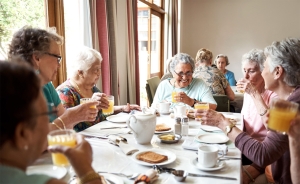In 2013, some thirty years after Diana Nyad tossed in the proverbial towel on her dream to swim from Cuba to Florida, she returned to the ocean—at age 64—to complete the dangerous feat. It took her 5 attempts over four years to complete the 110-mile ultra-swim that she failed to do at age 28.
Diana is proof that you’re never too old to get back in the water and swim after a dream. Her achievement is not just a testament to the ability of the body to adapt to physical conditioning at any age, but to the power of mindset, social support, and trust in the possibility of “What if I still can?”
It’s true that she had the benefit of modern training techniques and nautical technology, both of which had come a long way since the 1970s. These things were not what kept Diana in the pool or the ocean every day for hours.
Diana did something each of us can learn to do:She embraced the wisdom of her age and life experience to shift her thinking away from all the things she did wrong or should’ve done differently. By letting go of regret and resentment, Diana could channel her energy into the possibility of what she could do—and could she—just possibly—do now what she physically failed to do in her youth?
Today’s older adults are entering their sixties with a desire to revitalize goals and dreams from their younger days. And, we want our lives to be meaningful and healthy well into our 80s.
Even if you weren’t an athlete “in a former life,” there are many things you can do to maintain—or restore—healthy exuberance in your sixties and beyond. Before we talk about those tips, let’s understand the changes that we all face in our sixties.
Mind and Body Changes that Take Place After Age 60
The changes that began in your 40s and 50s carry over become more noticeable in your 60s:
- Tiring more easily
- Increased recovery time from illness and injury
- Loss of muscle mass leads to reduces strength & flexibility
- Slowing metabolism can lead to weight gain
- Lower libido & other changes in sexual function
- Being more forgetful and less focused
- Feeling less emotionally resilient
- Increased risk for falling and for fractures
- Changes in appetite and food preferences
- Reduced control of bladder function
Also, you want to be sure to keep-up with routine health screenings based on your age and gender.
6 Ways to Be Healthy in Your 60s so You Can Be Active in Your 80s
The six tips presented here are a good starting point for discussion with your healthcare provider to create a plan that suits your needs. If you are an Everbrook Senior Living resident—or thinking about becoming one—we have an array of health and wellness programs to help you reach your goals.
1. Cultivate Optimism
No matter your age, how you think about yourself and your experiences has a significant influence on how you feel physically and emotionally. As we learn from Diana’s story, it is never too late to make amends with ourselves or with others and flex a different mindset. To adopt a more positive outlook—and see the possibilities that are within your reach—consider the benefits of mindfulness practices.
At Everbrook Senior Living, we offer many such programs including yoga, guided imagery, journaling, meditation, music and arts programming. Mindfulness practice help us still the mental chatter, let go of stress and worry, and cultivate a non-judgmental perspective. In addition to supporting emotional wellbeing, mindfulness practices have been shown to help lower blood pressure, reduce muscle tension and chronic pain, and contribute to exceptional longevity and health in older adulthood,
2. Keep Moving
Physical activity is medicine for body and mind, providing numerous benefits for folks age 60 and older:
- improves range of motion, coordination & balance, which decreases risk for falls
- stronger bones & improved joint health
- improves blood flow to muscles & vital organs, supporting overall health
- enhances learning, memory, mental processing & focus
- enhances sleep
- builds social connections when we exercise with others
- lowers the risk of chronic illness
There is enough variety of exercise programs for you to find something you love—or to rekindle an activity you enjoyed long ago. Inquire with your local YMCA, JCC, or your Everbrook wellness concierge if you have a specific interest and need help getting started.
If you’ve maintained your fitness level throughout your life, then you may be your own version of Diana Nyad, and have a higher capacity for vigorous exercise—and the next Big Goal!
3. Exercise Your Brain
The best way to prevent cognitive decline and memory problems that are typical with aging is by exercising your brain. Be sure you are getting out and about: Visit farmer’s markets, craft shows, museums, and local parks. Do a daily puzzle or a word search. Read widely and often. Gather with friends for an evening of games. Take an art class. Learn new technology or pick-up an instrument and fiddle around. At Everbrook, you have access to a great variety of social, arts, and cultural programs and trips. We also offer specialized memory care programming.
4. Nourish Your Body
A healthy diet is essential to disease prevention and maintaining youthful vitality. As an older adult, your nutritional needs change quite a bit. Your activity level drives your body’s need for calories, but nutrient needs after age 60 become more specific and in some cases will be higher than what you needed in your 30s and 40s!
Older adults also may want to consider a few specific nutritional: calcium, magnesium, fiber, vitamin D, vitamin B-6, vitamin B-12, probiotics, and Omega-3 fatty acids. Always check with your health provider or a licensed nutritionist before starting any type of supplement.
5. Nurture Social Connections
Studies show that older adults who are socially connected are less prone to feelings of loneliness, anxiety, and depression. Socially connected adults also seem to live longer, more fulfilling lives. Make time to meet regularly with friends and family, check-in on your neighbors, join a hobby group or book club, take a class, or volunteer in your community. Also, it’s important for older adults to maintain intimacy with their partners.
6. Prioritize Sleep
As we age, we tend to experience interrupted sleep. This can be due to aches and pains that wake us, medications, or illness that affects the quality of sleep. If you have trouble falling or staying asleep, you can create a sleep routine to help you get the rest you need.
Investing in your health and wellbeing is something you can do (or resume doing) at any age. If you want to be part of a community that values your wellbeing throughout the Golden Years, and where you can find support for what inspires you to be well and live well, look no further than Everbrook Senior Living. We hope you will reach out to us, today!





